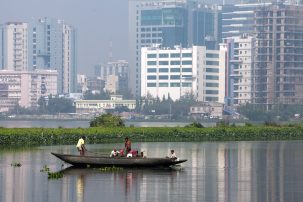Urbanization12
-

Toward Resilient Cities and Landscapes
The Center for Resilient Cities and Landscapes at GSAPP is dedicated to helping communities thrive in an age of climate uncertainty. Missed the launch event? Watch it here.
-

Climate Migrants Will Soon Shift Populations of Many Countries, Says World Bank
If emissions of greenhouse gases remain high, as many as 143 million “internal migrants” might move within their own countries by 2050.
-

California’s Misguided Attempt to Force Urban Density
Government should encourage urban living by making it more affordable and attractive, and provide incentives for density; it should not try to mandate it.
-

The Mass Transit Man
Thomas Abdallah, adjunct professor at Columbia University, is working to make the NYC subway system more sustainable.
-

Planting a Park on the Cross-Bronx Expressway Would Save Money and Lives
Public health researchers run the numbers on creating a park on top of a section of the highway, finding it a worthwhile investment for community health.
-

So Much Depends on a Tree Guard
Adding protective barriers around street trees could reduce load on city sewers, study finds.
-

Sustainability Measurement in China: Fostering a Race to the Top
The Research Program on Sustainability Policy and Management recently released the China Sustainable Development Indicator System, a new sustainability indicator framework and annual ranking of the sustainability performance of Chinese cities.
-

Could Robo-Taxis Kill Public Transportation?
Self-driving cars will fundamentally change how we live and work. But not all of those changes will be positive.
-

Main Streets, Malls, and Sustainable Consumption
As new technologies continue to change consumption patterns, land use and social norms, we have an opportunity to ensure these changes result in an exciting sustainable lifestyle in a new type of sustainable city.

By studying thousands of buildings and analyzing their electricity use, Columbia Climate School Dean Alexis Abramson has been able to uncover ways to significantly cut energy consumption and emissions. Watch the Video: “Engineering a Cooler Future Through Smarter Buildings“
